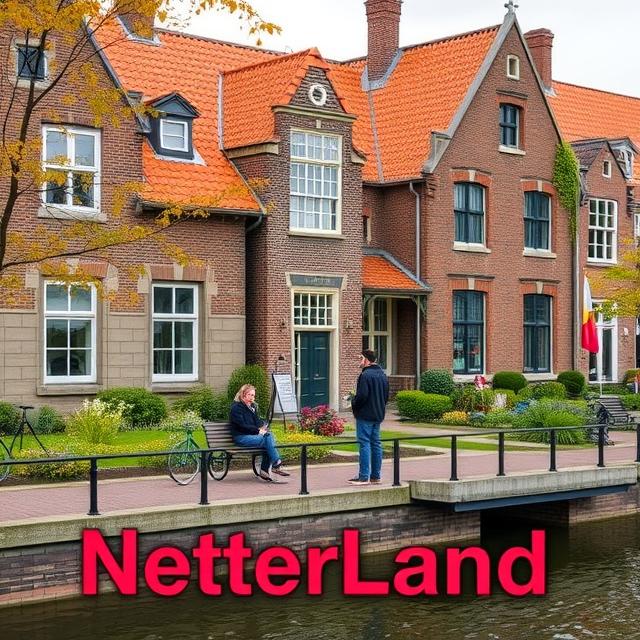Top 10 Scholarships in the Netherlands for PhD Researchers in 2025
The Netherlands is renowned for its world-class research institutions, vibrant international community, and attractive living standards. For aspiring PhD researchers, it’s a highly desirable destination, attracting talent from across the globe. However, funding a PhD can be a significant challenge. Thankfully, the Netherlands offers a wealth of scholarship opportunities to support promising researchers in pursuing their doctoral dreams. This article delves into the top 10 scholarships available for PhD researchers in the Netherlands, projected for 2025, offering a detailed overview of each program, eligibility criteria, application process, and benefits.
Navigating the Dutch Funding Landscape
Before diving into specific scholarships, it’s essential to understand the broader funding landscape for PhD researchers in the Netherlands. Funding generally comes from three main sources:
- University Employment: Many PhD positions are fully funded by the university or a research institute, meaning the researcher is employed as a member of staff, receiving a salary and benefits.
- External Funding: Scholarships awarded by external organizations, foundations, or government agencies.
- Self-Funding: Researchers secure their own funding, often a combination of personal savings, loans, and smaller grants.
This article focuses on scholarships falling under the ‘External Funding’ category, providing opportunities for researchers who may not have secured a university-funded position. These scholarships often offer a competitive edge, allowing researchers to choose their research topic and university, rather than being tied to a pre-defined project.
Top 10 Scholarships for PhD Researchers in the Netherlands (Projected for 2025):
Please note: Exact deadlines and eligibility criteria for 2025 may vary, so always consult the official website for the most up-to-date information.
1. Orange Knowledge Programme (OKP)
- Website: https://www.nuffic.nl/en/subjects/orange-knowledge-programme
- Focus: The Orange Knowledge Programme (OKP) is designed for professionals from specific developing countries. It aims to strengthen the capacity of individuals and organizations in these countries through education and training. While primarily focused on short courses and master’s programs, it occasionally offers opportunities for PhD studies, particularly in areas aligned with the Dutch government’s development priorities.
- Eligibility: Applicants must be nationals of and working in one of the eligible countries. They need to demonstrate a strong commitment to their field and the development of their home country. Typically, applicants require an unconditional offer from a Dutch higher education institution for a PhD program.
- Benefits: The OKP scholarship covers tuition fees, living expenses, visa costs, insurance, and travel costs. The scholarship aims to cover all the necessary expenses for a PhD student during their study in the Netherlands.
- Application Process: Application is usually through the Dutch institution where you’ve been accepted for the PhD program. The institution will then nominate eligible candidates to Nuffic (the Dutch organization for internationalization in education).
- Key Areas: Agriculture, Food Security, Water Management, Sexual and Reproductive Health, Security and Rule of Law.
- Why it’s Top 10: The OKP provides a comprehensive funding package and a unique opportunity to contribute to the development of your home country.
2. Holland Scholarship (for non-EEA students)
- Website: https://www.studyinnl.org/finances/holland-scholarship
- Focus: The Holland Scholarship, funded by the Dutch Ministry of Education, Culture and Science and Dutch research universities and universities of applied sciences, is geared towards international students from outside the European Economic Area (EEA) who want to pursue a PhD in the Netherlands.
- Eligibility: Applicants must be non-EEA nationals and have a strong academic record. They must also have been accepted into a PhD program at a participating Dutch higher education institution.
- Benefits: The scholarship provides a one-off payment of €5,000 in the first year of studies. This can significantly help with initial costs like accommodation and settling in.
- Application Process: Applicants apply directly to the Dutch higher education institution where they have been accepted for their PhD program. Each institution has its own application deadlines and procedures.
- Key Areas: Open to all fields of study offered by participating institutions.
- Why it’s Top 10: While it’s a one-off payment, the Holland Scholarship offers crucial initial financial support and is open to a wide range of disciplines.
3. European Union’s Marie Skłodowska-Curie Actions (MSCA)
- Website: https://marie-sklodowska-curie-actions.ec.europa.eu/
- Focus: The MSCA are part of the EU’s Horizon Europe program and support researchers at all stages of their careers, regardless of nationality. Within the MSCA framework, Doctoral Networks (DNs) offer opportunities for PhD training.
- Eligibility: Eligibility varies depending on the specific DN project. Generally, candidates need to hold a master’s degree and meet the specific requirements outlined in the DN’s call for applications. Nationality requirements are usually very broad.
- Benefits: MSCA Doctoral Networks provide a highly competitive salary, living allowance, mobility allowance, and family allowance (if applicable). They also offer extensive training and networking opportunities.
- Application Process: Applicants apply directly to specific Doctoral Network projects advertised on the MSCA website and other academic job boards.
- Key Areas: Varies depending on the specific Doctoral Network project. MSCA funds research across all disciplines.
- Why it’s Top 10: The MSCA Doctoral Networks provide unparalleled training and career development opportunities, coupled with attractive funding. The focus on international collaboration is also a significant benefit.
4. Fulbright Program
- Website: https://eca.state.gov/fulbright
- Focus: The Fulbright Program, sponsored by the US government, provides grants for US citizens to study, conduct research, or teach abroad. It also offers opportunities for foreign students to pursue graduate studies in the US. While primarily aimed at studies in the US, some Fulbright Commissions offer grants for research related to US studies in other countries, which could include the Netherlands.
- Eligibility: Applicants must be US citizens (for grants to study abroad) or citizens of specific countries with Fulbright Commissions (for grants to study in the US). The specific eligibility criteria vary depending on the country and type of grant.
- Benefits: Fulbright grants typically cover tuition fees, living expenses, travel costs, and health insurance.
- Application Process: US citizens apply through the Fulbright US Student Program. Foreign students apply through the Fulbright Commission or US Embassy in their home country.
- Key Areas: Varies depending on the specific grant.
- Why it’s Top 10: The Fulbright Program is a prestigious and highly competitive scholarship that offers excellent funding and cultural exchange opportunities.
5. Nuffic Scholarships (Country Specific)
- Website: https://www.nuffic.nl/en
- Focus: Beyond the Orange Knowledge Programme, Nuffic occasionally offers specific scholarships tailored to students from particular countries. These scholarships often focus on priority areas for development cooperation between the Netherlands and the target country.
- Eligibility: Nationality requirements are strict and are the first filter applied. Successful applicants must have strong academic credentials.
- Benefits: Typically covers tuition fees, living expenses, travel costs, and insurance.
- Application Process: Through the Dutch institution where you are accepted, or directly to the funding body in your country.
- Key Areas: Development related fields
- Why it’s Top 10: A targeted approach helps improve chances compared to more generally applicable funding sources.
6. The Gratama Foundation Grant
- Website: (Please note: Information may be limited as this foundation operates on a smaller scale. Direct contact or university support may be necessary)
- Focus: The Gratama Foundation supports talented individuals pursuing advanced studies, often with a focus on social impact. While they do not exclusively fund PhD studies, they have supported PhD researchers in the past.
- Eligibility: Open to Dutch nationals or those with a strong connection to the Netherlands. Applicants should demonstrate exceptional academic achievements and a commitment to contributing to society.
- Benefits: The grant amount varies depending on the individual needs of the applicant.
- Application Process: Usually involves a detailed application form, academic transcripts, letters of recommendation, and a personal statement outlining the research project and its potential impact.
- Key Areas: Broad range of disciplines, with a preference for projects with social relevance.
- Why it’s Top 10: While smaller in scale, the Gratama Foundation provides vital support for promising researchers and values projects that aim to address societal challenges.
7. Local University Scholarships:
- Website: (Varies by University, e.g., https://www.universiteitleiden.nl/scholarships for Leiden University).
- Focus: Many Dutch universities offer their own scholarship programs for international PhD researchers. These scholarships are often highly competitive but can provide significant financial support.
- Eligibility: Varies by university, but generally requires excellent academic performance and acceptance into a PhD program at the university.
- Benefits: Can cover tuition fees, living expenses, and travel costs. The extent of coverage differs significantly from university to university.
- Application Process: Apply directly to the university’s scholarship program after being accepted into a PhD program.
- Key Areas: Varies by university.
- Why it’s Top 10: University-specific scholarships can be a good option if you already have a preferred institution in mind.
8. Erasmus+ Programme
- Website: https://erasmus-plus.ec.europa.eu/
- Focus: Erasmus+ is a European Union program supporting education, training, youth, and sport in Europe. Although primarily known for student exchange programs, it also funds joint doctoral programs and other initiatives that support PhD researchers.
- Eligibility: Eligibility depends on the specific program or project within Erasmus+. Generally, applicants need to be from a participating country and meet the specific requirements of the call for applications.
- Benefits: Varies depending on the program, but can include tuition fees, living expenses, and travel costs.
- Application Process: Apply directly to specific Erasmus+ projects or programs advertised on the Erasmus+ website and other academic job boards.
- Key Areas: Varies depending on the specific program.
- Why it’s Top 10: Erasmus+ offers a diverse range of opportunities for PhD researchers, particularly within collaborative and international projects.
9. The Prince Bernhard Cultural Foundation (Prins Bernhard Cultuurfonds)
- Website: https://www.cultuurfonds.nl/ (Dutch Language)
- Focus: While primarily focused on supporting arts and culture, the Prince Bernhard Cultural Foundation also provides grants for research in related fields. They often support projects that explore Dutch cultural heritage.
- Eligibility: Open to Dutch nationals or those with a strong connection to Dutch culture. The research project must have a clear cultural component.
- Benefits: The grant amount varies depending on the individual needs of the applicant and the scope of the project.
- Application Process: Involves a detailed application form outlining the research project, its cultural significance, and a budget proposal.
- Key Areas: Arts, Culture, History, Heritage Studies.
- Why it’s Top 10: A valuable option for researchers whose work explores Dutch cultural heritage or intersects with the arts.
10. Specific Faculty Funding:
- Website: (Varies by University Faculty – check individual faculty websites)
- Focus: Individual faculties within Dutch universities often have dedicated funding streams for PhD research that might not be widely advertised. These funds can support specific research projects or thematic areas.
- Eligibility: Typically, requires acceptance into a PhD program within that specific faculty and alignment of the research proposal with the faculty’s research priorities.
- Benefits: Varies considerably. May cover full funding, partial funding, or research expenses.
- Application Process: Contact the faculty directly to inquire about available funding opportunities and application procedures.
- Key Areas: Depends on the faculty’s specific research focus.
- Why it’s Top 10: A targeted approach can uncover valuable, niche funding opportunities within specific departments.
Conclusion
Securing funding for a PhD in the Netherlands requires careful planning, thorough research, and a well-crafted application. While the landscape of scholarships can be complex, the opportunities highlighted in this article provide a strong starting point for aspiring PhD researchers. Remember to always consult the official websites for the most up-to-date information and tailor your application to meet the specific requirements of each program. By taking the time to explore these options and prepare diligently, you can significantly increase your chances of realizing your doctoral aspirations in the Netherlands. Good luck!



